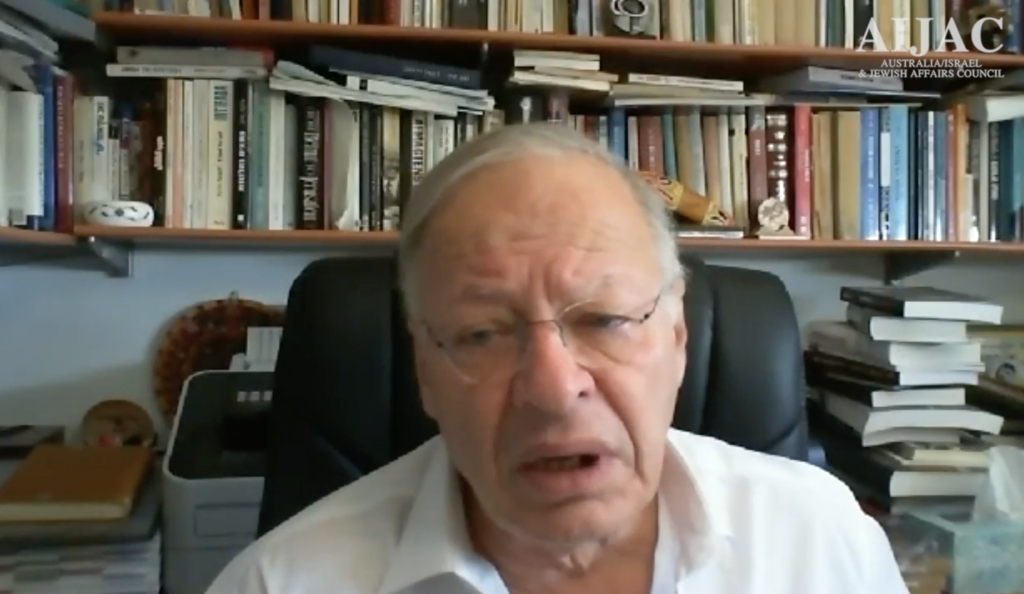Australia/Israel Review
Ehud’s Mideast insights
Sep 7, 2020 | Jamie Hyams

Israel is blessed with incisive, insightful and entertaining news analysts, likely the product of being the centre of so much news itself. However, not many of them can casually flavour an analysis of the dilemma facing the leader of an Arab country technically at war with Israel with an anecdote about having regularly brought the man his favourite Middle Eastern delicacies during his exile in France. But more about Lebanese President Michel Aoun later.
With that level of both access and experience, you know a discussion with Ehud Yaari will always be something special, and his briefing to journalists for AIJAC on Aug. 20 was no exception.
Yaari began by discussing the recent normalisation agreement between Israel and the United Arab Emirates (UAE). He explained that the deal was initiated by UAE leader Mohammed bin Zayed (MBZ), who saw an opportunity to publicly justify the move by representing himself as the one who stopped Israel’s plans to apply sovereignty over parts of the West Bank.
One of MBZ’s motivations, according to Yaari, was that Arab countries that make peace with Israel generally receive modern US weapons, and being a pilot, MBZ is particularly interested in the F-35 combat aircraft. Yaari expects the UAE will obtain these, despite Israeli public opposition, but they will be a “sterilised” version compared to those in Israel’s Air Force.
Other Arab states have been slow to emulate the UAE, partly because, as Yaari revealed, MBZ wanted to bask in the limelight by himself, so he gave them very little notice. However, Yaari does expect a number of other Arab states to make similar arrangements.
As he puts it, “We are already watching a number of Arab leaders wearing their swimsuits, walking alongside the pool, waiting to jump in.” He thinks the next country may be Bahrain, whose leader is very eager; Sudan; Oman, with which Israel has had good relations since 1978; or Morocco, with which Israel has been sharing tourists since the 1950s.
The Saudis, he says, are interested, but will be slower, while Kuwait was the only Gulf state to take a negative stance.
Turkey, he says, has become the capital of the Muslim Brotherhood, and is in an informal alliance with Qatar, which finances its adventures, including incursions in Libya and Somalia. It is “playing rough” in the eastern Mediterranean, opposed by Greece, Cyprus, Italy and Israel, which are backed by the EU and US.
The Trump Administration, however, believes Turkey is needed to bring order in Syria, as it stopped Iran and Russia in Idlib. Meanwhile, Yaari says, there is rapidly growing tension between Russia and Iran in Syria, because Russia wants control in Damascus, no longer needs Iran, and is not wedded to Syrian leader Bashar al-Assad.
On other fronts, Sudan is backing the Saudis in Yemen, and Oman, which has often been an intermediary between Iran and the Gulf states (and between Iran and Israel), can no longer play that role because of tensions with Saudi Arabia over Yemen.
Palestinian leader Mahmoud Abbas is frustrated with the Israel-UAE deal, but even some high-profile Palestinians have supported it. He asked for emergency meetings of the Arab League and the Organisation of Islamic Cooperation, but there have been no meetings.
Yaari said he doubts the recent violence from Gaza will escalate, saying that the Qatari financial assistance package to the Strip expires in September, so Hamas is stirring up trouble to pressure Qatar to extend it (the package has since reportedly been extended and enlarged).
Yaari also says it’s safe to assume that the US policy of supporting Israel will remain regardless of who wins the US presidential election, as many of those advising Biden are from the Clinton era. However, the trend of US disengagement from the Middle East will also continue.
China’s interest in the Middle East, he says, is mainly commercial for now, and Israel is now working to restrict sales of sensitive items to China, making clear it is with the US first. He is very sceptical about the purported Iran-China deal, given that, while Iran has been vocal about it, China has been silent, and he can’t see why China would risk its achievements with Saudi Arabia, the UAE and Egypt.
And what about Michel Aoun and his recent comment his country could potentially have peace with Israel? Aoun, a Christian, is President under Lebanon’s sectarian political system, which reserves that role for Christians, but got there due to support from Hezbollah, Yaari noted.
Yaari revealed that the Patriarch of Lebanon’s Maronite Christian Church, whom no practising Maronite can oppose, is now campaigning to de-link Lebanon from all regional conflict. Trapped between his Patriarch and his political allies, and wanting his son-in-law to succeed him as President, Aoun, says Yaari, is currently paralysed. Perhaps he needs another delivery from Yaari’s deli.
Tags: Israel, Middle East






